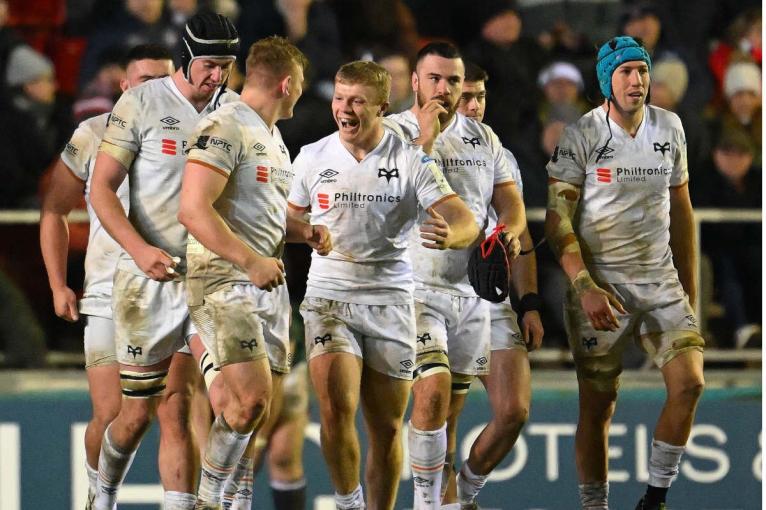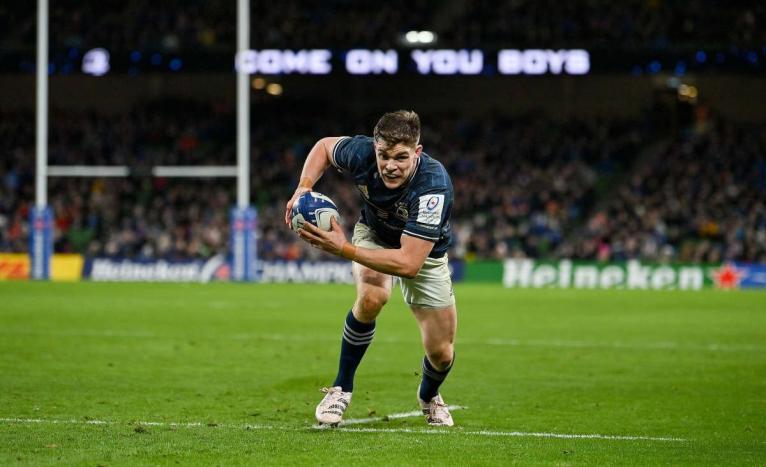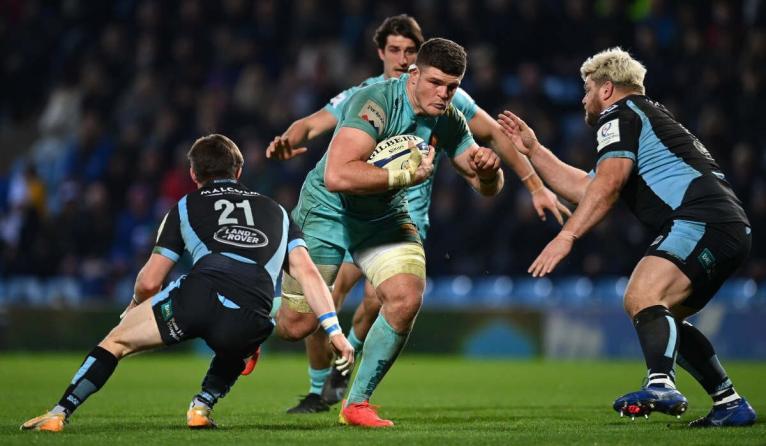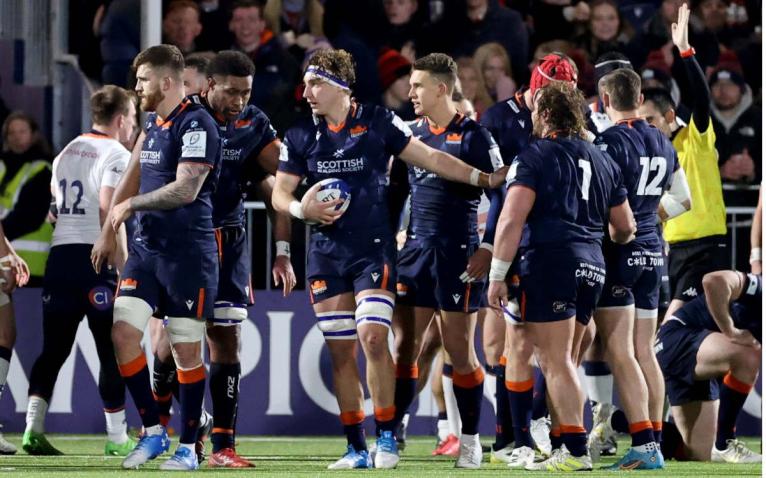The Champions Cup knockout fixtures have been announced and, for now, they will be carefully filed away until the Spring, because the Six Nations hyperbole will envelop the minds of all rugby fans in the Northern Hemisphere for the next few months, but first there is much to feast on after a compelling weekend of rugby, which saw injuries mounting up and Test coaches covering their eyes…
The Gatland effect courses through Welsh rugby
Warren Gatland doesn’t yet have Graham Henry’s moniker as the ‘Great Redeemer’ but after just 48 days, in which he has conducted one press conference and been spotted at a couple of games, the belief is tentatively seeping back into Welsh rugby, just in time for a tilt at a Six Nations title.
Whether it’s coincidental, is a moot point – especially when the farcical, damaging stand-off between the WRU and the regions continues – but the players deserve immense credit for rolling up their sleeves. Spearheading that, of course, is the Ospreys, who have made it to the knock-out stages of the Champions Cup, after a double over French champions, Montpellier, and a thrilling last-gasp win over English Champions, Leicester at Welford Road.
The Ospreys pack, especially, is a weapon Gatland will be keen to harness, and the way the gained the upper hand on a Leicester front-five including Dan Cole and Julian Montoya, is encouraging. Jac Morgan, at 22, has made a mockery of Wayne Pivac’s comment that he lacked physicality, by becoming a threat with the ball-in-hand, regularly skittling Leicester defenders, and the wily Justin Tipuric, will surely add guile and a rare skill to any Test backrow. It shouldn’t be forgotten that Tigers’ best player was Tommy Reffell, who duked it out with the Welsh duo for breakdown scraps, and didn’t come off second-best.

Cardiff Rugby have shown with Mason Grady, Rhys Carre and Teddy Williams that they can produce Test class players and the Scarlets have finally started showing winning form, with six wins in seven, after a spell of form that saw questions asked of Dwayne Peel’s leadership, while the Dragons under Dai Flanagan look a much happier environment since Dean Ryan left the region stage door left, with Leon Brown and Aaron Wainwright adding their raw athleticism to the squad.
Gatland is waiting to see how much power he can wield in his second incarnation and Wales coach. Indeed, can he entice the likes of Cory Hill and even Jake Ball back into the fold? Can he push through a change to the 60-cap law he introduced back in 2019, to give it a modern lick of paint and reduce it to suit the current financial landscape which is seeing Welsh players lured away from playing at home due to the uncertainty, and finally, can he somehow broker a more harmonious relationship between warring factions in a country that cannot afford such acrimony.
Leinster still have questions to answer
Any team that qualifies for the knock-out stages with the most points scored and fewest conceded really should be spared criticism.
Yet here we go. On Saturday, Leinster won 36-10 against a genuine heavyweight, Racing 92, retaining their composure after a nervy opening half, coping with the absence of Johnny Sexton by seeing not one Byrne brother but two bring authority and skill to the control room.
Some of their performers, Garry Ringrose in particular, but also new kid, Jamie Osborne, were superb, while the collective quality of the team’s finishing was world class.
Ringrose made a salient point in his post-match interview, though, namely that it’s pretty irrelevant what happens in January, when the prizes are being handed out in May. More to the point, Leinster haven’t won that prize since 2018, the subsequent years telling a familiar tale of big bullies doing damage to their morale.

Well, we saw more of that on Saturday, the Leinster scrum creaking, their line-out troubled, and it was like the ghosts of previous seasons had re-appeared, those bitter memories of the damage Will Skelton inflicted upon them in a Saracens and La Rochelle shirt across the last four seasons.
Munster – PR masters
The amount of praise Munster’s new coaching team has received this season has been too generous. These continued references to the brilliance of their new training programme, the upgrade to their attack, the miserliness of their defence, is all well and good, but they’re still losing as many games as they are winning.
In the URC, they have played twelve, lost six; in the Champions Cup, they have played four, lost two. And yes, further context is required, namely that they are in the process of a rebuild, (Conor Murray, Keith Earls, Simon Zebo are no longer guaranteed starters), while adjusting to a new style of play.
Reform takes time and this current coaching team should be given plenty of it to finish the job they have started.
The thing that grates is the constant undertone from observers that the old regime under Johann van Graan was inadequate and that the new one is so much better. Is that really the case? Munster have lost six URC games after two thirds of this season; the most they lost in a regular season under van Graan was seven.
Munster have squeezed into the Champions Cup knockouts despite losing twice to Toulouse, lavished with praise for the quality of their performance in France yesterday. Last year, under van Graan, they drew with Toulouse, before losing a penalty shoot out.
The current Bath coach also brought the team to two Champions Cup semi-finals during his time in Limerick, overseeing wins over Exeter, Racing, Toulon, Saracens, Leicester, along the way. So, yes, maybe his training wasn’t as good as the current regime’s. His results were, though. In fact they were better.
Let’s reserve our praise for Graham Rowntree et al until they actually win something significant. All they have won so far is good PR.
Welsh flavour to Exeter rebuild
There’s a changing of the guard down Exeter way. For the longest time, this has been the fortress of Cornish rocks and Devonian titans, the home of Nowell and Cowan-Dickie and Simmondses and Skinners, local heroes who have sculpted the plucky South West upstarts into European royalty.
One by one, the giants are leaving. Grown too large to squeeze beneath the tightened Premiership salary cap. The pull of France, new challenges and a trouserful of Euros, is strong. As much as they love their old stomping ground, Exeter are no longer able to keep them.
Luke Cowan-Dickie and Sam Simmonds are off to Montpellier. Brother Joe has been linked with numerous French clubs, including Racing 92, and most recently Pau. Jack Nowell is weighing up his options but it would be a shock if he decides to stay. Montpellier are said to be keen on the Lions winger too. Dave Ewers, the colossal Zimbabwean, has been a Chief for 13 years. He has signed for Ulster, a replacement, perhaps, for Duane Vermeulen. Jannes Kirsten, the South African who helped Exeter to the double in his second season, is expected to return to the Bulls. Stuart Hogg is out of contract and rumours are swirling about his future. Sam Skinner and Tom O’Flaherty left the building in the summer. Don Armand retired. Tomas Francis went to Wales to keep alive his Test ambitions.
Rob Baxter knew this day was coming. In tying down all this talent to their most recent contracts, he knew a huge chunk of his protagonists would have deals expiring at once and that the league’s financial realities would prevent him retaining them all. Whatever, it feels like a seminal point in the Chiefs’ evolution, farewelling the conquerors of England and Europe and ushering in a new era.

What will the rebuild bring? New signings are scant; so too rumours while Exeter assess their options. But at the heart of the new Exeter will be two young Welsh tyros. Daffyd Jenkins and Christ Tshiunza have come of age in the European arena this past month, turning domestic promise into Champions Cup excellence.
Sam Warburton has been shouting long and loud about 21-year-old Tshiunza to anyone who will listen. His ‘post-contact’ work, the hunger to spring up from a mighty hit and clatter anything in his path, had the great man purring. Tshiunza is huge, lean, athletic and rapid, a trait he showed on Saturday night, galloping home to finish a fine last-minute score as Exeter trounced Castres. He already has a handful of caps despite only breaking into his club team a year ago.
Jenkins is a bruiser too, no question. He turned 20 in December but like Tshiunza, has ability beyond his years and like Tshiunza, is a Welsh international already. It feels cruel to label a player so, but comparisons with Alun Wyn Jones are inevitable. He is calling and winning Exeter lineouts, charging around paddocks and generally getting through a mountain of grunt work. He has cute subtlety to his game and a soft pair of hands.
These young men may desire a contract in Wales, particularly while the WRU’s 60-cap threshold for exiled players remains in place. Exeter will be desperate to keep them. For these are young totems around which Baxter can construct his new generation.
Edinburgh’s top end can beat anybody
Mike Blair’s face told the tale. After a game of searing intensity, close to Test-level in its pressure and its abrasiveness and its brutality, the Edinburgh coach gazed emotionless from his little box in the stand. Edinburgh had beaten Saracens. Euphoria was erupting around the stadium. Supporters unaware that Saracens’ losing bonus point denied Edinburgh a home tie in the Champions Cup last 16, sending them to the lair of Leicester Tigers instead of facing the Ospreys in the Scottish capital.
It was a confused finale to an engrossing European tussle. Edinburgh, leading by six points, attacking into the red. Henry Pyrgos opting to kick the ball out and the end the match with his attack going nowhere fast. A win, yes, and a superb one at that. But a strange emotional maelstrom at the end.
Saracens, brilliant and stubborn and riling though they are, did not deliver a vintage performance. Edinburgh had a lot to do with that. They dominated collisions, bludgeoned the Saracens juggernaut and penalties fell out of them like a beaten pinata. The final tally was 19. At one stage, Saracens were down to 13 men, with Jamie George and Marco Riccioni dispatched to the bin for high shots which left both hurt on the floor. How George, who appeared to exhibit several concussion symptoms, was allowed to return is alarming. This should not happen in professional rugby but season on season, it does. The sport continues to grapple with the existential threat of brain injury and its handling of them.
With George and Riccioni off, Edinburgh were wasteful. They spurned a glut of red-zone ball, Jamie Ritchie spilling over the line, Bill Mata taking a quick-tap and Edinburgh coughing up possession. They had opportunities to kill Saracens off, or at least build a commanding lead, and they allowed the English heavyweight to survive on the ropes.
This is a good news story for Scottish rugby, though. The performance of the pack, in particular, will give Blair great heart, but also Gregor Townsend, watching from the main stand, as he prepares to take Scotland to Twickenham in a fortnight’s time.

Luke Crosbie, in the continued absence of Hamish Watson, is a beast. Sam Skinner looks back to his best. Grant Gilchrist is an underappreciated soldier. WP Nel, in all likelihood Scotland’s starter in London, played the full 80 minutes and won a huge scrum penalty in the last of them. Nel is 37 in April. Pierre Schoeman’s star shone brightest. The loose-head prop delivered an eye-watering 21 carries for over 40m in a dynamite full-game performance. Those are enormous numbers.
What a boon this is for Edinburgh, even if a home tie should have been theirs, even if there is a sliver of missed opportunity about it. Edinburgh – and Blair – will take heart from the victory and all that it brings. His team were navigating a stick winter period, beaten handily twice by Glasgow Warriors, smashed at home by Munster, meek in Treviso and only just seeing off winless Zebre Parma with the final play of the match. A bonus-point victory at Castres and this rousing triumph before a full DAM Health Stadium has restored the feelgood.
Their only loss in the Champions Cup came at the StoneX. A coulda-woulda-shoulda. Saracens were missing their talisman and general in Owen Farrell but you wonder if Edinburgh might have mustered more attacking panache had Duhan van der Merwe, Darcy Graham and Emiliano Boffelli not been sidelined. The positive, of course, is that Saracens were vanquished without any of them on the pitch.
Home advantage is crucial in Europe. That has been proven time and again, year on year. The numbers show around 70% of knockout matches are won by the home side. Welford Road will be full and raucous and Edinburgh will need their best rugby, again, to conquer it.
URC – the Underrated Rugby Championship
Here’s a simple question. If the URC is as inferior to the Premiership and the Top14 as Anglo/French observers never shy away from telling us, then how come all eight entrants in this year’s competition made it through to the round of 16?





Comments
Join free and tell us what you really think!
Sign up for free